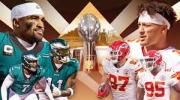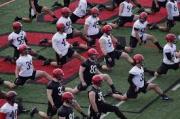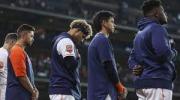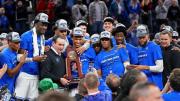
by: Gene Clemons
When they say Black Monday in the NFL, they really mean it. This week the NFL found themselves back at square one; one black head coach in a league represented by 70% black players. That is the lowest black head coach number since 1991. What's really strange is that this offseason one would have assumed that the number of black head coaches would increase from the depressingly low number of three in 2021. Instead, the Houston Texans fired David Culley after one season where he didn't have a starting quarterback and was given no resources to win. The Miami Dolphins fired Brian Flores after three seasons and the last two seasons were winning seasons for a team that has not recorded back-to-back winning seasons since the 2002-2003 seasons. So now Mike Tomlin, who is the second longest tenured head coach in the league, remains as the only black head coach in the NFL.
There are eight head coaching openings in the NFL this offseason. It is not a guarantee that any will be filled with black coaches. What the Rooney Rule really exposed is that teams are really good at interviewing coaches they have no intentions of hiring. In many cases over the years, we have seen guys interviewed for head coaching positions and then we never hear anything about them again. What happened; was the interview so bad that nobody ever wanted to interview him again? The truth seems to be that coaches are being interviewed simply to satisfy the Rooney Rule, not because owners and front offices have a legitimate desire to diversify their leadership.
We have seen a lot of names talked about for head coaching jobs but how many of them are black coaches? We have heard Flores' name included in a few of those searches. That makes sense when you consider how egregious his exit from Miami seems to be. Other names we have heard are both Buccaneers' coordinators; Todd Bowles and Byron Leftwich, and Patriots defensive coach Jerod Mayo. Outside of that many names we here are not being given any serious consideration.
There's a chance that the aforementioned names will not be considered. Is it really just about the pool of candidates; are we to seriously believe there are more qualified white coaches who are deserving of head coaching opportunities? So how is it that we find ourselves with Mike Tomlin as the only consistent black man as an NFL head coach? Especially when you consider how many times people have questioned whether Tomlin's time in Pittsburgh should end.
There are two things in play that keeps the wheels of process from moving in the NFL: nepotism and time. It's so easy to just chalk this issue up to white owners choosing to hire leadership they are familiar with but why are there always so many prominent white assistants to choose from? How many times have we seen the son of a former coach who has worked their way up the ladder? Usually, they work their way up on their father's staff or on their father's buddy's staff.
Names like, Belichick, Shanahan, Schottenheimer, Gruden, Reid, and countless others have multiple family members in the league as coaches or former coaches. The longer a coach lasts, the more experience without pressure to perform at a high level their son's get. How long was Kyle Shanahan able to work on his craft while underneath the watchful eye of his father. Bill Belichick's son is currently enjoying that advantage and all while clicking off valuable years of experience with titles they did not earn.
Meanwhile a coach like David Culley climbed his way up from the bottom. He started as a running backs coach at Austin Peay in 1978. He spent 15 seasons at various college football stops around the county. He started his NFL career with the Buccaneers and spent the next 16 years working his way up the NFL coaching ladder. Finally, when he gets his chance to run his own show, of course it is not with a quality team or even a stable program. But what else was he to do, it took 30 plus years just to get someone to ask him. Clearly,he was going to jump on the opportunity, trust in his preparation and bet on himself to make the situation work for him.
Against all odds that's exactly what he did. The Houston Texans won four games this season and it is safe to say that the plan from the top was to not win any. They fought until the end of the season, they showed improvement from the beginning of the year until the end, and they identified some key pieces that may be a part of the organization's rise as they moved forward. What else could he have done? It didn't matter, the fix was in from the beginning and unfortunately for a man who has waited his entire adult life for his opportunity to lead a team, he was used as a placeholder for another coach. That's the type of treatment black coaches get, and it is utterly disappointing.
During this coaching cycle you will read all of these pieces about the need for diversity at the head coach position. You will see talking heads debating about it on sports shows and you will listen to podcasts where people like me articulate our disappointment in the lack of black men afforded the opportunity to lead. You know where you won't hear it coming from, the players. You never really hear much from the current players about the lack of black general managers, head coaches and coordinators in the NFL. On the outside looking in it makes you wonder if they care.
What we must all keep in mind is that they are still employees. As much as we would like for them to stand up and show their displeasure, that comes at what cost? The NFL is so competitive, and the salary cap is structured so that you can't really question any decision to move on from a player. Colin Kaepernick was blackballed from the NFL, and he never accused owners of inherently racist hiring practices. If that can happen to a popular starting quarterback, then no other position player is immune.
Personally, I would love to see the entire players union ban together on issues other than just money. I would love to see them uniformly decide that they will not play if there is not a significant increase in black head coaches in the league next season. Then hold those new black head coaches' feet to the fire to hire black coordinators so that the coaching pool more accurately reflects the demographics of the league. Alas I do not have anything to lose as an outsider and I know the opportunity to establish generational wealth is a lot to put in jeopardy. I guess I am just disappointed in everyone. We stood by and watched this happen, how long will we continue?
###
Gene Clemons is a Sports Analyst and Contributor to CWN Sports. His weekly column and podcast - Gene Therapy focuses on Sports, Politics and Social/Urban issues.
Read more












